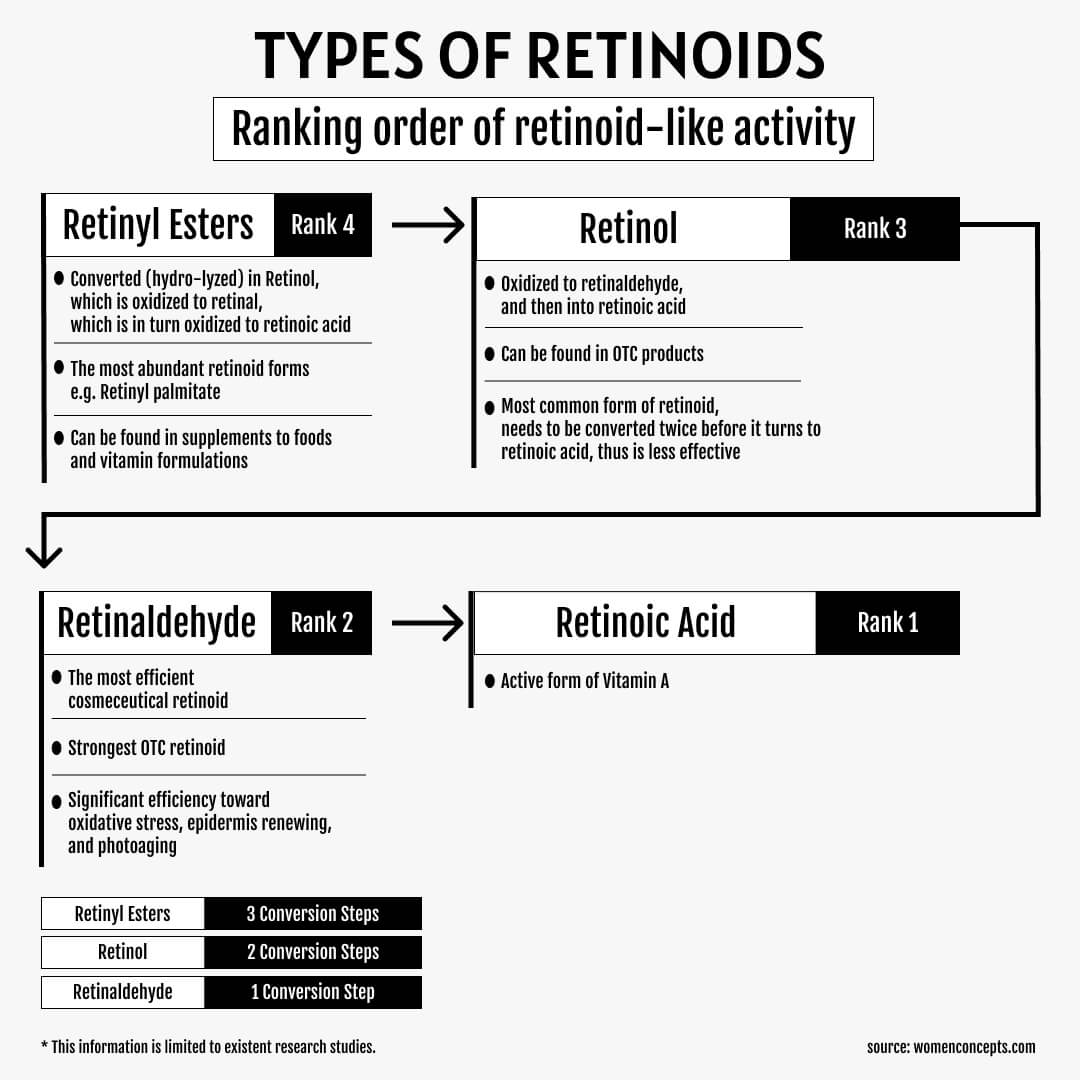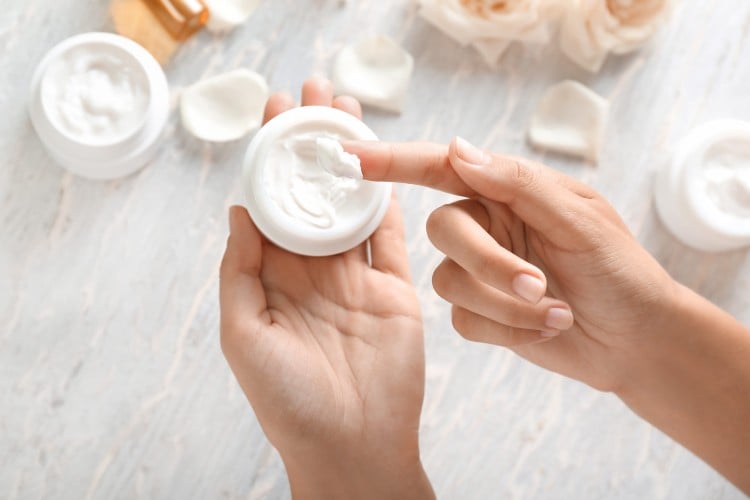It’s time to talk about some of the most coveted skincare treatments: Retinol and tretinoin. Both come from vitamin A and have the same effects on the skin. But have you ever wondered why you can find one at your local store, but the other isn’t as straightforward to get? Well, tretinoin is much more concentrated than retinol, so it’s regulated as a medication. Below, we take a closer look at the differences between retinol and tretinoin and see how far apart they are in terms of effectiveness.
What is retinol and tretinoin?
Both retinol and tretinoin are retinoids (derivatives of vitamin A) that work to renew the skin. They stimulate cell turnover (the process of growing new skin cells) and treat conditions such as wrinkles, acne, and hyperpigmentation. However, retinoids don’t start working as soon as you use them on your skin. They must first be converted into their active form by some enzyme. This active form is called retinoic acid.
So it’s not retinol and tretinoin that does the heavy lifting but retinoic acid. This guy can bind to protein molecules in the skin cells. When it does that, it induces a variety of molecular changes in the skin, including the acceleration of cellular turnover and the boost of collagen production (a protein that provides structure and elasticity to the skin). That said, the efficacy of retinol and tretinoin relies on this conversion.
This leads us to the next question:
What is the difference between retinol and tretinoin?
The main difference between retinol and tretinoin lies in the number of conversions they have to go through to reach their active form, retinoic acid. Both retinol and tretinoin must first be converted into retinoic acid by special enzymes in order to work. The potency of retinol and tretinoin is affected by this number of conversions. Retinoids with the closest proximity to retinoic acid are the most effective, while those that need more conversions have slower effects. Tretinoin is more effective than retinol because it doesn’t need to be converted into retinoic acid since it’s the active form of vitamin A. Retinol, on the other hand, must be converted twice into usable retinoic acid, so it’s less effective and takes more time to work.
Another difference is their availability in the market. You can’t just go out and buy tretinoin; you need a prescription from a dermatologist. Retinol, on the other hand, is OTC available and you can find it in local stores.
How much less effective is retinol than tretinoin?
According to studies, retinol is 20 times less effective than tretinoin. This is because retinol converts twice—once to retinaldehyde and then to retinoic acid—to become active.[1] Tretinoin is already in the active form of vitamin A, so it doesn’t need to be converted. What’s worrying is that the conversion process is slow and results in only 5% of retinol being converted to retinoic acid.[2] This means retinol works at a much slower pace than tretinoin.

If we look at these study numbers, we can get a clue of the differences in effectiveness between retinol and tretinoin.
Let’s assume that only 5% of retinol is converted to retinoic acid and retinol is 20 times less potent than tretinoin. This means you need a lot more retinol to get the same effect as tretinoin. For instance, a 1% tretinoin cream is similar to a 20% retinol cream. But it’s not just about strength; it’s also about the time each takes to work. Tretinoin starts working as soon as you apply it to your skin since it’s already in the active form. Retinol, on the other hand, takes time to convert to retinoic acid. This makes it slower to show results. This time lag can vary, but it’s not unreasonable to estimate that retinol might take 10 times longer to work if not more.
Another study gives us a different view on retinol and tretinoin. This study tried to find out if retinol is that much weaker than tretinoin. To do this, researchers made three different creams with retinol (0.25%, 0.5%, and 1.0%) and compared each to a tretinoin cream with 10 times less strength (0.025%, 0.05%, and 0.1%). They had people with sun-damaged skin use one cream on one half of their face and the other cream on the other half.
| Retinol Concentration | Tretinoin Concentration | Time To Work (Approximate) |
|---|---|---|
| 0.25% | 0.025% | Similar effectiveness at 12 weeks |
| 0.5% | 0.05% | Similar effectiveness at 12 weeks |
| 1.0% | 0.1% | Similar effectiveness at 12 weeks |
Researchers checked the results at 4, 8, and 12 weeks. And guess what? By the end of the study, both retinol and tretinoin had similar effects on the skin—we’re talking less wrinkles, brighter skin tone, less dark patches, and smoother skin. And here’s the kicker: there wasn’t a big difference in how well retinol and tretinoin worked. They were on par with each other.
Is retinol safer than tretinoin?
Yes, it is, for the same reason retinol is less effective than tretinoin—it takes longer to convert. Overall, retinol is safer than tretinoin, especially for those with sensitive skin or for first-time users of retinoids. Retinol is less potent and takes longer to convert into its active form, which results in fewer side effects like redness and irritation. Tretinoin, being more fast-acting, can be more aggressive, potentially causing more intense skin reactions.
Which one should you use?
Ask yourself these questions:
Are you in your 20s and have no acne? Use retinol and start with a 0.1% concentration. In your 20s but with severe acne? Talk to a dermatologist about tretinoin treatment to clear your skin.
Do you have sensitive skin, or is it your first time with retinoids? Starting with retinol can be a more comfortable introduction to retinoids. Are you in your 30s and have sun-damaged skin? Use a higher concentration of retinol or a low concentration of tretinoin. For someone over 50, tretinoin is the best choice since it’s more concentrated and more effective for aging signs.



![Does resveratrol in red wine benefit your skin? While sipping on a glass of red wine can be a delightful experience, relying on it for skincare benefits is not the best idea. Sure, red wine contains a smidge of resveratrol, but let's put things into perspective. The concentration of resveratrol in red wine is relatively low. Red wines, specifically Pinot noir from France, typically contain 0.361-1.972 mg of resveratrol per liter.[8] To hit that reference dose of 500mg of resveratrol, you'd need to drink a lot of wine. We're talking about downing anywhere from 100 to 1000 glasses per day. It's a scene straight out of a wine lover's wildest dreams, but definitely not the healthiest approach. Resveratrol Benefits for Skin](https://womensconcepts.com/wp-content/uploads/2022/03/Resveratrol-Benefits-for-Skin.jpg)

